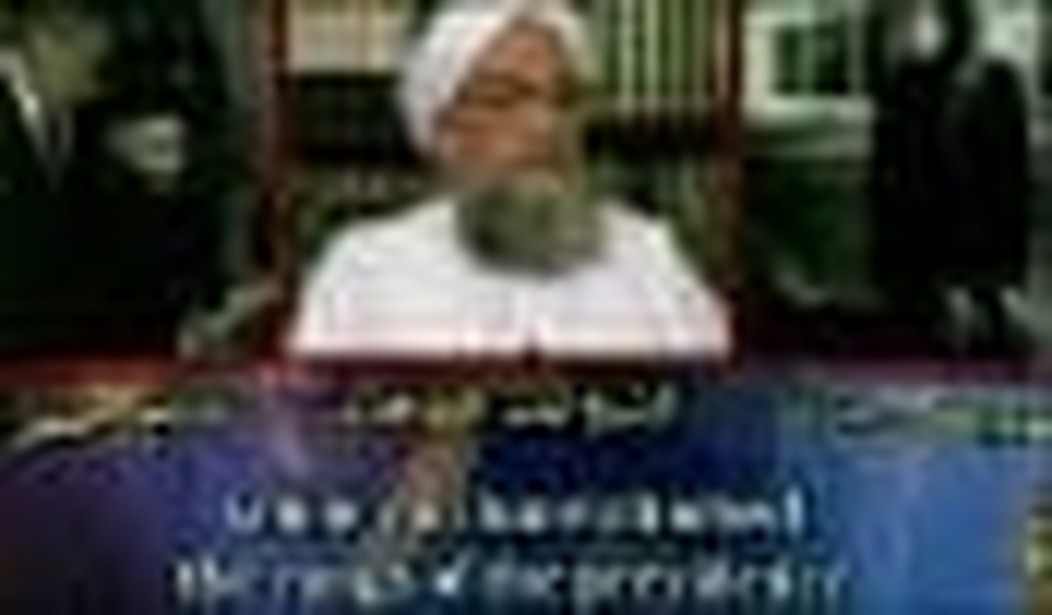So al-Qaeda number two Ayman al-Zawahiri has given Barack Obama what Hot Air blogger Ed Morrissey calls “the Belafonte treatment,” condemning the president-elect — along Colin Powell and Condoleezza Rice — with what the media calls a “racially-charged epithet.” Depending on which translation you believe, Zawahiri either called Obama a “house-slave,” or used an even more “charged” phrase — the same insult Harry Belafonte and fellow black activists have hurled at Powell, Rice, and other African Americans who have the temerity to become prominent Republicans. Zawahiri — apparently channelling Jesse Jackson as well as Belafonte — also compared Obama unfavorably to black radical figures such as Malcolm X.
Zawahiri’s outburst must have come as a shock to the more deluded Obama supporters (as opposed to the regularly deluded ones), who apparently thought al-Qaeda and the Taliban would be lining up along Pennsylvania Avenue on January 20 to lay down their weapons at Obama’s feet before rolling over to let him rub their tummies and joining the crowds in a teary rendition of Obama’s Gonna Change It. But if the more imaginative liberal pundits are to be believed, Zawahiri’s anger is perfectly understandable.
As they would have it, al-Qaeda wanted John McCain to win the election because he would perpetuate and perhaps intensify the conflicts in Iraq, Afghanistan, and elsewhere that are the jihadists’ raison d’être. Obama, on the other hand, would reach out to Muslims and Arabs and make right the injustices inflicted on them by the U.S., thereby depriving al-Qaeda of the recruits it needs to sustain its worldwide campaign of terror.
This line of thinking has spawned an entire canon of liberal journalism, of which this Washington Post column by David Ignatius is typical. Ignatius argues that “Obama makes the jihadists nervous because he is an appealing new face whose ascension undermines the belief that Islam and the West are locked in an inescapable clash of civilizations.”
Ignatius also claims Obama would thwart the jihadists’ plan of “drawing America ever deeper onto the battlefields of Iraq, Afghanistan and Pakistan.” Apparently he’s unaware that America is currently well-placed to begin withdrawing from the battlefields of Iraq, and is doing a pretty good job of knocking off al-Qaeda and Taliban leaders in Pakistan’s tribal areas from afar. And he must not be familiar with Obama’s much-vaunted threat to invade Pakistan if necessary to take on the terrorists.
In support of his thesis Ignatius quotes a fatwa in support of McCain issued by the radical Sheik Yusuf al-Qaradhawi — albeit one that wasn’t very charitable about Obama. Qaradhawi said: “Personally, I would prefer for the Republican candidate, McCain, to be elected. This is because I prefer the obvious enemy who does not hypocritically [conceal] his hostility toward you … to the enemy who wears a mask [of friendliness].”
Qaradhawi is clearly a fan of the McCain “straight talk,” but he also appears to have followed the Democratic primaries closely. The Clintons and their supporters will attest to Obama’s ability to conceal his hostility behind a “mask of friendliness.” Qaradhawi started to lose the plot, however, when he claimed that “The Democrats kill you slowly without you noticing it. … They are like a snake whose touch is not felt until its poison enters your body.” It’s not clear what he meant by that; perhaps he was thinking of the effect their policies tend to have on the U.S. economy.
Other “endorsements” of McCain appeared on various Islamist websites. But did Qaradhawi, Zawahiri, bin Laden (if he’s even alive), and the rest of the jihadist leadership really want McCain to win? They may indeed have been rooting for the “never-ending war” candidate, but apparently the liberal commentariat, trusting fellows that they are, aren’t familiar with a concept popularly known as “reverse psychology.”
It doesn’t seem to have occurred to any of these sages that perhaps al-Qaeda wanted Obama to win all along, and that when the pundits of the North West Frontier Province came out for McCain they were in fact calculating that their endorsement would persuade wavering Americans to vote for Obama — thinking that in doing so they were both defying attempts to intimidate them, and electing the candidate the jihadists secretly feared.
Of course it’s also possible that al-Qaeda really did want McCain to win, and that their endorsement was a double-bluff that backfired: they predicted that the American public would see a terrorist endorsement of McCain as a crude attempt to get them to vote for Obama, and would instead vote for McCain. If that’s the case they apparently credited a lot of voters, along with Ignatius and his colleagues, with way too much intelligence.
But if al-Qaeda hoped to get out the McCain vote they could have done more than issue a couple of sparsely-reported statements over the Internet. Days before the 2004 election Osama bin Laden issued a video in which he didn’t endorse either candidate, but instead issued threats against the U.S. in general terms. It’s hard to know what effect the video had on the result, but it’s likely many undecided voters decided to go with George Bush as the better option for keeping American safe.
So while it’s possible that Zawahiri and his colleagues were angered by the media’s treatment of Sarah Palin, it’s also possible that they’re perfectly happy with Obama’s victory, and that his attack on Obama is merely boilerplate to fire-up the faithful. There’s no way of knowing what the Islamists really hoped to gain from the election — at least not until the New York Times serializes bin Laden’s memoirs. But we can consider which outcome would best serve their interests.
Would al-Qaeda have preferred the candidate who got the biggest strategic decision in the war on terror right when he called for a “surge” of American forces in Iraq? Or would they want the candidate who got it utterly wrong by opposing the surge and claimed it would make matters worse, and who for months refused to deny its success in the face of overwhelming evidence to the contrary?
Would they prefer the candidate who has been unshakable in his support for America’s men and women in uniform, or the candidate who accused U.S. forces in Afghanistan of doing nothing but “air-raiding villages and killing civilians”; who joined his Democrat colleagues in undermining the Bush administration’s attempts to fight the war at home and abroad at every turn, until he secured his party’s nomination and it became expedient for him to appear more hawkish; and who talks about “ending” wars but never about winning them?
Would they prefer the candidate with decades of military and political experience, or the community organizer with movie-star appeal who, in an effort to prop up his national security credentials, chose a running mate who proposed splitting Iraq along sectarian lines, and who claimed in the vice-presidential debate that the United States (with the help of France) had “kicked Hezbollah out of Lebanon”?
The Islamists may be prepared to fight the West for a hundred years, but they also want to win. Such has been the progress in Iraq that it would take a blunder of colossal proportions by Obama to snatch defeat from the jaws of victory there, but the future of Afghanistan is still in the balance. And on the available evidence al-Qaeda may have decided that for all his rhetoric about invading Pakistan, Obama isn’t really up for the fight.
We’ll find out next year. Will Obama keep up the attacks on the al-Qaeda and Taliban leadership, or will he indulge Pakistan’s politicians when they ask for a suspension of hostilities while they engage in another round of “peace talks” with the militants? Which of his contradictory policies will Obama pursue towards Iran, and towards Israel and the Palestinians? Will he defer to the UN, or make life-or-death decisions with an eye on public opinion both at home and overseas?
While the demands of office may convert Obama into a pragmatist, there’s much in his past — including his morally equivocating response to 9/11 — to suggest he shares the leftist view that America needs to change its ways, and engage with its enemies rather than fighting them. It’s largely for that reason that the world is celebrating his election, and despite Zawahiri’s outburst, it’s likely that his victory was as popular in Waziristan as it was in London, Paris, and Berlin.









Join the conversation as a VIP Member